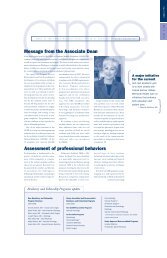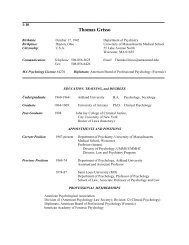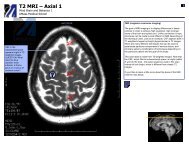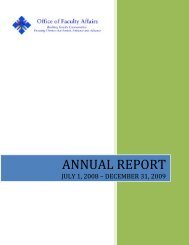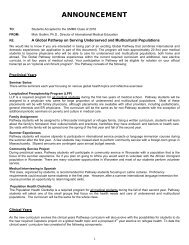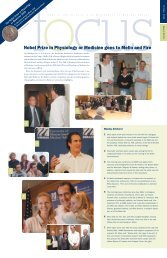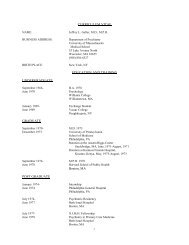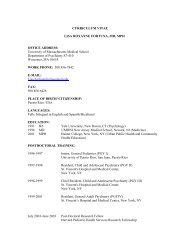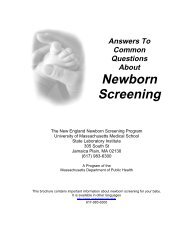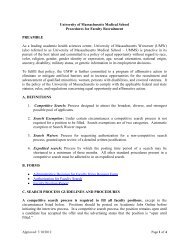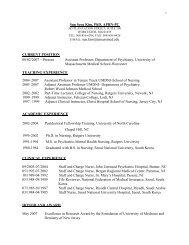Anger Management Manual - the ATTC Network
Anger Management Manual - the ATTC Network
Anger Management Manual - the ATTC Network
You also want an ePaper? Increase the reach of your titles
YUMPU automatically turns print PDFs into web optimized ePapers that Google loves.
A Cognitive Behavioral Therapy <strong>Manual</strong><br />
in a way that is respectful of o<strong>the</strong>r people. For example, if you were upset because a friend was<br />
repeatedly late for meetings, you could respond by shouting obscenities and name-calling. This<br />
approach is an attack on <strong>the</strong> o<strong>the</strong>r person ra<strong>the</strong>r than an attempt to address <strong>the</strong> behavior that<br />
you find frustrating or anger provoking.<br />
An assertive way of handling this situation might be to say, “When you are late for a meeting<br />
with me, I get pretty frustrated. I wish that you would be on time more often.” This statement<br />
expresses your feelings of frustration and dissatisfaction and communicates how you would<br />
like <strong>the</strong> situation changed. This expression does not blame or threaten <strong>the</strong> o<strong>the</strong>r person and<br />
minimizes <strong>the</strong> chance of causing emotional harm. We will discuss assertiveness skills in more<br />
detail in sessions 7 and 8.<br />
Myth #4: Venting <strong>Anger</strong> Is Always Desirable. For many years, <strong>the</strong> popular belief among numerous<br />
mental health professionals and laymen was that <strong>the</strong> aggressive expression of anger, such<br />
as screaming or beating on pillows, was healthy and <strong>the</strong>rapeutic. Research studies have found,<br />
however, that people who vent <strong>the</strong>ir anger aggressively simply get better at being angry<br />
(Berkowitz, 1970; Murray, 1985; Straus, Gelles, & Steinmetz, 1980). In o<strong>the</strong>r words, venting<br />
anger in an aggressive manner reinforces aggressive behavior.<br />
<strong>Anger</strong> as a Habitual Response<br />
Not only is <strong>the</strong> expression of anger learned, but it can become a routine, familiar, and predictable<br />
response to a variety of situations. When anger is displayed frequently and aggressively,<br />
it can become a maladaptive habit because it results in negative consequences. Habits, by<br />
definition, are performed over and over again, without thinking. People with anger management<br />
problems often resort to aggressive displays of anger to solve <strong>the</strong>ir problems, without<br />
thinking about <strong>the</strong> negative consequences <strong>the</strong>y may suffer or <strong>the</strong> debilitating effects it may<br />
have on <strong>the</strong> people around <strong>the</strong>m.<br />
Breaking <strong>the</strong> <strong>Anger</strong> Habit<br />
Becoming Aware of <strong>Anger</strong>. To break <strong>the</strong> anger habit, you must develop an awareness of <strong>the</strong><br />
events, circumstances, and behaviors of o<strong>the</strong>rs that “trigger” your anger. This awareness also<br />
involves understanding <strong>the</strong> negative consequences that result from anger. For example, you may<br />
be in line at <strong>the</strong> supermarket and become impatient because <strong>the</strong> lines are too long. You could<br />
become angry, <strong>the</strong>n boisterously demand that <strong>the</strong> checkout clerk call for more help. As your<br />
anger escalates, you may become involved in a heated exchange with <strong>the</strong> clerk or ano<strong>the</strong>r customer.<br />
The store manager may respond by having a security officer remove you from <strong>the</strong> store.<br />
The negative consequences that result from this event are not getting <strong>the</strong> groceries that you<br />
wanted and <strong>the</strong> embarrassment and humiliation you suffer from being removed from <strong>the</strong> store.<br />
Strategies for Controlling <strong>Anger</strong>. In addition to becoming aware of anger, you need to develop<br />
strategies to effectively manage it. These strategies can be used to stop <strong>the</strong> escalation of<br />
anger before you lose control and experience negative consequences. An effective set of<br />
strategies for controlling anger should include both immediate and preventive strategies.<br />
11



